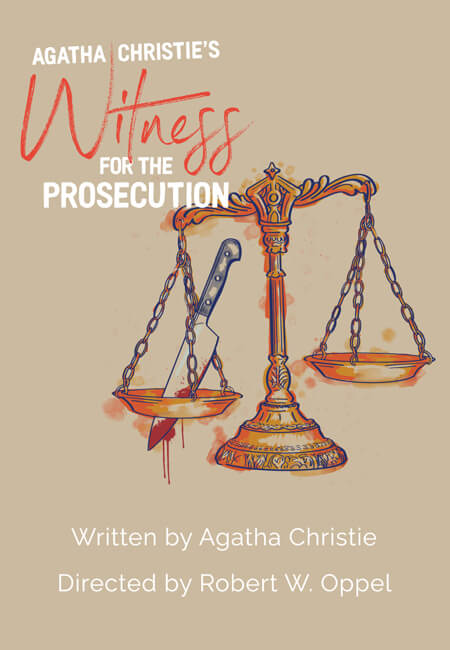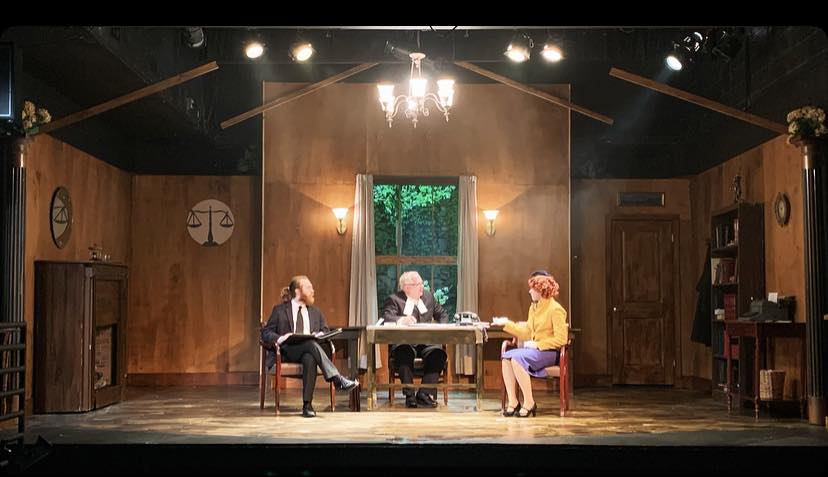Do you swear to tell the truth, the whole truth, and nothing but the truth? You can’t handle the truth! Though I might be mixing up my courtroom dramas as this one seemed to be skirting all around the truth, only revealing parts of the truth, and there was a lot of questionable truths floating in the ether. In true Agatha Christie style, Witness For the Prosecution splashes onto The Vagabond Players stage to kick of the 2024-leg of their 108th season. Directed by Robert W. Oppel, this stage thriller will set you pondering over the whole thing from start to finish, but buckle up, because it’s a lengthy doozy!

The set is one of the most grandiose I can ever recall seeing at Vagabond Players, possibly since Next To Normal over a decade ago. Set Designer Sammy Jungwirth, who doubles as the show’s lighting designer, has pulled out all the stops and recreated this impressive English solicitor’s chambers and Old Bailey courtroom, as a flip-spin, albeit manually, set. The wooden interior is robust and hearty, creating the sense that you’ve been transported to Christie’s home country, in a time long ago. The detail to the set’s interior is impressive, really drawing you into the show’s setting (though the flora poking its way through the glassless window of the chambers/courtroom should be pulled back/drawn back just a hair so that it doesn’t poke through and show that there isn’t actually glass in the panes.) And the way the sets furnishings spin to transform from chambers to courtroom and back again showcases Jungwirth’s impressive understanding of how to maximize scenic impact while making use of the limited spatial availability. It’s a breathtaking set and lit accordingly, though the one truly impressive lighting effect rolls up at the conclusion of the show and therefore cannot be discussed for fear of spoiling the ending.
Matching the pristine aesthetic created by Jungwirth, Costume Designer Tammy Oppel fills out the show’s sartorial selection with period appropriate flare. While there isn’t much to be said for the costumes of the gentlemen (let’s face it, they had boring fashion then much the same as they have boring fashion now) she hits the proverbial nail on the head when it comes to the costumes for the female characters. Oppel favors some of the more hearty shades of the time period, including that rich mustard-gold, and fits the costumes to the players accordingly so that everyone looks as if they’re being featured in the same drama from the same era; not always an easy or achievable feat at the community level.
One of the more impressive things about Jungwirth’s set is the way it plays into the show’s pacing. Stage Manager Jess Corso runs a tight ship, keeping the scenery-flips concise. The first two times the stage furniture is flipped coincides with the show’s two intermissions and this is brilliant. But the third and final transition, from courtroom back to chambers, happens in a semi-darkout on stage and is in much need of a sound cue or some instrumental music with ominous undertones to cover it. Even with a swift run crew and precision execution, this change is a clunky two minutes in darkness that could be easily forgiven with the simple addition of some sort of soundscape design. This aside, Corso handles the scenery transitions with ease and seasoned know-how.

The show’s overall pacing is solid, with the exception being during the second act, occurring entirely in the courtroom. This particular act seems to meander and muddle a bit in all of the questioning of the various witnesses. (It was disclosed prior to viewing that the leading player for the role of Sir Wilfred Robarts was replaced relatively late in the game before the production opened and this may have played a factor in some of the meandering confusion of the scene.) There’s already a great deal of natural confusion distorted into the drama of the text, raising and edging the stakes along, all done by thriller-mastermind Agatha Christie. The troublesome pacing in this scene adds a layer of unnecessary and unwarranted confusion that slightly hampers the progress of the show as a whole. But this middle act aside, Director Robert W. Oppel seems to understand Christie’s agenda and keeps the suspense burbling right through to the conclusion of the performance.
To his credit, understudy actor Thomas Peter stepped into the opening night performance as Justice Wainwright and became of the more comical players in the courtroom of the evening. Peters’ intonation, general delivery, and overall presence upon the high bench was perfectly in line with the story’s natural flow and if it hadn’t been noted in a performance card in the lobby, no one would be the wiser of his last-minute substitution. Other minor characters worthy of note were the Court Officer (Lou Otero) and the Stenographer (Morgan Wenerick.) Otero spends a lot of time ‘swearing witnesses’ in and gets the only direct audience interaction, which is an unusual but very much welcome instance in this Agatha Christie mystery. (Otero’s officer character steps into the house and picks a random audience member from the front row to read the jury’s verdict as well as asks them to swear in earlier in the production.) Wenerick, who is mostly seen-only, keeps her composure behind the stenography machine, never flinching or faltering when the scene runs aground lost in its textual placement. And whoever fidgeted with the actual sound effect of the stenography machine (likely Director Robert W. Oppel as there is no sound designer credited in the program), they’ve balanced it sublimely. Ever-clacking away in the background but delicately and at such a level that you only notice it every once in a while, like a clock metering out the minutes as time goes by.
You get the impression right from the off that you’re in for a doozy of a show when you encounter Mr. Carter (Andy Belt) and Greta (Peri Walker) in the opening scene. Clerks and assistants to the honorable Q.C. Sir Wilfred Robarts, both Belt and Walker are cameo performances that set the tone and the mood for the show as a whole, with Belt presenting the severity of the drama and Walker serving as something akin to comedic relief. Walker in particular is bubbly, perky, and the 1920’s/30’s equivalent of Elle Woods when it comes to optimism. Belt, who doubles up later as witness called Thomas Clegg, sets the high bar of expectations when it comes to accents for the performance. And across the board, those committing to the English, German, and Irish accents do so impressively.
The play itself features a mercurial performance from Matthew Payne as the accused prisoner Leonard Vole. (England does it differently, apparently, prisoner and guilty until proven otherwise.) From being off his head with grief and yet simple-minded and lighthearted, audiences will find themselves drawn to Payne’s performance like a moth to the flame. It’s the balance of ignorant innocence and earnest conviction in his portrayal that makes him so entrancing. That and his accent is flawless from top to tail, even when he’s in the emotionally overloaded throes of chaos, which happens at the end of Act II in such a powerful wave of intensity that the intermission cannot come soon enough. Payne is a gem and his working rapport with the other characters is a driving force in what keeps this show on track.
You get the affable, albeit timid, Mr. Mayhew (Xander Conte) and although its unclear exactly what position he holds (co-council? Defense attorney? He says it briefly very early on in the performance and then his title is never referred to again but he’s ubiquitously present for all of the proceedings) its clear that he is intent on helping Mr. Vole as much as possible. While the character is predominantly grounded and serious, you do get some of Conte’s more comedic antics in the courtroom scene, particularly when he’s trying to flag down the attention of Sir Wilfred; it’s background-scenery-chewing-silliness at its finest.
And when it comes to courtroom antics, none finer than the bombastic energy booming out of Joey Hellman as Mr. Myers, QC, the opposition to Sir Wilfred (Toby Hessenauer.) It’s wild getting to watch the two of these seasoned stage-men go at it under the pretenses of courtroom drama. Hellman is a spirit of prosecution, fitting as he’s the prosecution-lawyer in the murder trial of Mr. Vole, and when he interrupts, he nails that ‘biting-frenemy-insult’ intonation sublimely. (My English better half explained to me long ago that the antic in both The Old Bailey and in Houses of Parliament roll along to the tune of high-biting insults guised in phraseology like “My learned friend, my esteemed colleague,” things of that nature, so to hear Hellman biting on those so hard really tickles the fancy and will add a great deal of authenticity to anyone from England who attends the performance!) Hessenauer holds his own in the role, having come to the production late with the lion’s share of the dialogue to be delivered. There’s a tiredness to Hessenauer’s character portrayal, perhaps a subtle nod of homage to the film version of Sir Wilfred, who has just recovered from a heart attack and isn’t meant to be taking on any heavy/stressful cases (all of that is cut from the stage drama.) There’s almost a flavor of Henry Drummond in Hessenauer’s portrayal, a defeated-but-determined flavor to the way he approaches the case he’s landed.
The real dazzling gems in this production are two fiery, feisty ladies— Romaine (Autumn Koehnlien) and Janet Mackenzie (Kathryn Winship.) Though neither share a scene with the other, they are equally passionate, memorable, and engaging whenever they are on stage. Winship, as the sassy, surefire cockney-mouthed, working-class house maid is a true pip! A little over the top at time with her facially-driven comedic antics, Winship really lets the character be gritty and lively. She’s only ever featured in the second act, on the witness stand, and she’s a true wild ride to encounter. Her cockney-working-class accent is really spot on as well, which adds a textured depth to her portrayal on the whole. Koehnlien, as the German wife of the accused prisoner, is fiery and passionate, particularly when it comes to her testimony on the stand. Her accent is thick but understandable and she allows the emotional intensity of her character’s feelings to radiate through her without overcoming being understood by the audience. Both Winship and Koehnlien, and to that Peri Walker and Morgan Wenerick, have a keen understanding of how a lady of the times carried herself, according to class, and makes the period of the drama that much more believable.
Ultimately a true stage thriller, some meandering in the second act aside, Witness For the Prosecution is an excellent start to 2024 and will keep you moving toward the edge of your seat in true Agatha Christie fashion. It’s unexpected, evocative, and particularly engaging. Don’t miss your chance to enjoy this classic this winter.
Running Time: 2 hours and 45 minutes with two intermissions
Witness For the Prosecution plays through January 28th, 2024 at Vagabond Players— located in the heart of Fells Point: 806 S. Broadway in Baltimore, MD. Tickets can be purchased by calling the box office at (410) 563-9135 in advance online.
